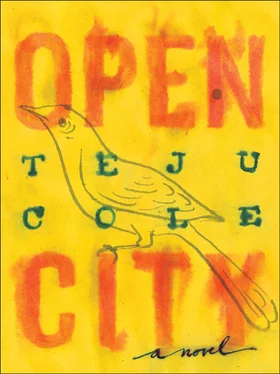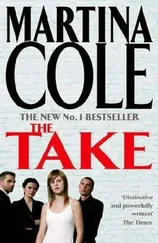Teju Cole - Open City
Здесь есть возможность читать онлайн «Teju Cole - Open City» весь текст электронной книги совершенно бесплатно (целиком полную версию без сокращений). В некоторых случаях можно слушать аудио, скачать через торрент в формате fb2 и присутствует краткое содержание. Год выпуска: 2011, Издательство: Random House, Жанр: Современная проза, на английском языке. Описание произведения, (предисловие) а так же отзывы посетителей доступны на портале библиотеки ЛибКат.
- Название:Open City
- Автор:
- Издательство:Random House
- Жанр:
- Год:2011
- ISBN:нет данных
- Рейтинг книги:5 / 5. Голосов: 1
-
Избранное:Добавить в избранное
- Отзывы:
-
Ваша оценка:
- 100
- 1
- 2
- 3
- 4
- 5
Open City: краткое содержание, описание и аннотация
Предлагаем к чтению аннотацию, описание, краткое содержание или предисловие (зависит от того, что написал сам автор книги «Open City»). Если вы не нашли необходимую информацию о книге — напишите в комментариях, мы постараемся отыскать её.
But it is not only a physical landscape he covers; Julius crisscrosses social territory as well, encountering people from different cultures and classes who will provide insight on his journey — which takes him to Brussels, to the Nigeria of his youth, and into the most unrecognizable facets of his own soul.
Open City — читать онлайн бесплатно полную книгу (весь текст) целиком
Ниже представлен текст книги, разбитый по страницам. Система сохранения места последней прочитанной страницы, позволяет с удобством читать онлайн бесплатно книгу «Open City», без необходимости каждый раз заново искать на чём Вы остановились. Поставьте закладку, и сможете в любой момент перейти на страницу, на которой закончили чтение.
Интервал:
Закладка:
How did you sleep? I said, and was about to ask her about the physicist from Cleveland, whether she was deaf, as I suspected, but Moji looked out over the river, narrowing her eyes. Then she turned to me and said, in a low and even voice, emotional in its total lack of inflection, that there were things she wished to say to me. And then, with the same flat affect, she said that, in late 1989, when she was fifteen and I was a year younger, at a party her brother had hosted at their house in Ikoyi, I had forced myself on her. Afterward, she said, her eyes unwavering from the bright river below, in the weeks that followed, in the months and years that followed, I had acted like I knew nothing about it, had even forgotten her, to the point of not recognizing her when we met again, and had never tried to acknowledge what I had done. This torturous deception had continued until the present. But it hadn’t been like that for her, she said, the luxury of denial had not been possible for her. Indeed, I had been ever-present in her life, like a stain or a scar, and she had thought of me, either fleetingly or in extended agonies, for almost every day of her adult life.
Moji went on in this vein for what was probably six or seven minutes. She told me who else had been at the party that night, and she described her precise memory of what had happened: we had both been drinking beer, she was close to passing out, and I had taken her to another room and forced myself on her. For weeks afterward, she said, she had wanted to die. I had refused to look at her, she said, and her brother Dayo knew that these things had happened, not that they had discussed it, but it was inconceivable that, in the shadows and absences of the night, he would not have known, and she hated him, she said, for having done nothing to protect her. And now, here we were, all grown up, and she still carried this hurt, which seeing me again, and seeing that I had lost none of my callousness, she said, had renewed and had brought back to her a distress comparable in intensity to what she had suffered in those weeks, only this time, she said, she had tried, for reasons unclear even to her, to keep her pain hidden and put a happy face on the situation. She had tried to forgive, she said, and to forget, but neither had worked.
Moji’s voice, which had never increased in volume, had by now taken on a strained, shattered tone, as if she were getting hoarse. You’ll say nothing, she said. I know you’ll say nothing. I’m just another woman whose story of sexual abuse will not be believed. I know that. Look, bitterness has been eating away at me all this time, because this was so long ago, and it’s my word against yours, and you’ll say it was consensual, or that it never even happened at all. I have anticipated all your possible answers. This is why I’ve told no one, not even my boyfriend. But he sees through you anyway, you, the psychiatrist, the know-it-all. I know you think he’s a buffoon. But he’s a better man than you. He is wiser, he understands life better than you ever will. That is why, without me having to tell him anything, he knows what a malign influence you have been on my life.
I don’t think you’ve changed at all, Julius. Things don’t go away just because you choose to forget them. You forced yourself on me eighteen years ago because you could get away with it, and I suppose you did get away with it. But not in my heart, you didn’t. I have cursed you too many times to count. And maybe it is not something you would do today, but then again, I didn’t think it was something you would do back then either. It only needs to happen once. But will you say something now? Will you say something?
Other people had woken up, and were beginning to move around inside the apartment. Moji stopped speaking, and kept her eyes focused on the shimmering Hudson. I thought she would begin to cry but, to my relief, she didn’t. Anyone who had come out onto the porch at that moment could not have imagined that we were doing anything other than enjoying the play of light on the river.
The just risen sun came at the Hudson at such an acute angle that the river gleamed like aluminum roofing. At that moment — and I remember this as exactly as though it were being replayed in front of me right now — I thought of how, in his journals, Camus tells a double story concerning Nietzsche and Gaius Mucius Cordus Scaevola, a Roman hero from the sixth century B.C.E. Scaevola had been captured while trying to kill the Etruscan king Porsenna and, rather than give away his accomplices, he showed his fearlessness by putting his right hand in a fire and letting it burn. From this act came his nickname, Scaevola, the left-handed. Nietzsche, according to Camus, became angry when his schoolmates would not believe the Scaevola story. And so, the fifteen-year-old Nietzsche plucked a hot coal from the grate, and held it. Of course, it burned him. He carried the resulting scar with him for the rest of his life.
I went inside, and greeted the risers. Five minutes later, I left. It wasn’t until several days afterward that, looking up the story elsewhere, I saw that Nietzsche’s contempt for pain had been expressed not with a coal but with several lit matchsticks that he had placed in the center of his palm and that, as they began to burn his hand, an alarmed school yard prefect had knocked to the ground.
TWENTY-ONE
Monday was my first full day in private practice. The practice, which my senior partner, David Ng, has run for fourteen years, is on the Bowery. It’s a pleasant office, on the third floor of a prewar building, with windows that open out to a clear view of lamp shops across the street, and the uncluttered sky above them. There has been no sign of this year’s bird migrations yet, but I know they will come. At quiet moments, I will be able to take the auspices to my heart’s content. It has been a busy month: only last week, I moved into a small apartment on West Twenty-first Street. The view there isn’t good, but it is a desirable neighborhood (as the realtor reminded me ad infinitum) and I am within walking distance of the office. A few weeks ago, I had the hand surgery I had been putting off. The pain is gone.
My fellowship ended with the end of summer, and I opted to work with Ng, though there were more lucrative offers farther from the city, of which the most attractive was in a group practice in Hackensack, New Jersey. It would have meant more money, the tranquillity of the suburbs, the things that more money can buy; but in the end it hadn’t been a difficult choice. Remaining here in the city is the only choice that makes emotional sense to me; my own instincts aided me, as did the professional advice of Dr. Bolt, the head of our service. Dr. Martindale, with whom I shared authorship of a couple of research papers, had tried to convince me to remain in academia, but it became clear a long time ago that the university setting is not for me.
I have begun to organize my office. The office is bare, for the most part, but I have brought in a few books, and my computer has been set up, with a pair of small speakers that I can use to listen to music in between appointments. I have already bookmarked on the computer one of the New York classical music stations, feeling more tolerant now of the announcers than I used to. A new sofa came in on Friday, and the smell of its fabric, a curious combination of lemon and dust, dominates the room, but none of the patients has complained yet. On the door outside is a beveled brass nameplate that Ng had made before I even arrived.
On the corkboard behind my chair is pinned a postcard of Heliopolis that I discovered by chance in a used bookshop two or three weeks ago. It is yellowed with age, and depicts a street shadowed by a building to the right. The building has what looks like a medieval European bell tower, with two pairs of columns on each side. Two men, tiny figures, walk along the side of the building. They are dressed in white robes. Another man, only a little larger, stands in the middle of the empty street, looking out at the photographer. He is also in an ankle-length white robe, but on top of his he wears a black jacket. To the right of this man, the street is patterned with the converging, silvery lines of a street tram and, near the horizon line, there are two trams. Their upraised, articulated elements, which connect them to overhead wires, make them look a little like houseflies. To the left of the otherwise bare street is a smaller, or perhaps simply more distant building, and one of the towers of this building is topped with an onion dome. The postcard, which is undated, simply reads, in small white print on the photograph, “9108 Le Caire, Heliopolis.” It is not a picturesque card. The sky is washed out, the shadows are dark, the composition of no great interest. It looks like something someone has forgotten, not something anyone would intentionally tack onto the corkboard. But I cannot shake the feeling that the small man in the black jacket and white robe, whose face is invisible because of the shadow of the street, plays the role of witness, and watches me while I work, and, indeed, it was this little figure who had first compelled me to pick up the card. Only later had I noticed that it depicted Baron Empain’s Heliopolis.
Читать дальшеИнтервал:
Закладка:
Похожие книги на «Open City»
Представляем Вашему вниманию похожие книги на «Open City» списком для выбора. Мы отобрали схожую по названию и смыслу литературу в надежде предоставить читателям больше вариантов отыскать новые, интересные, ещё непрочитанные произведения.
Обсуждение, отзывы о книге «Open City» и просто собственные мнения читателей. Оставьте ваши комментарии, напишите, что Вы думаете о произведении, его смысле или главных героях. Укажите что конкретно понравилось, а что нет, и почему Вы так считаете.












